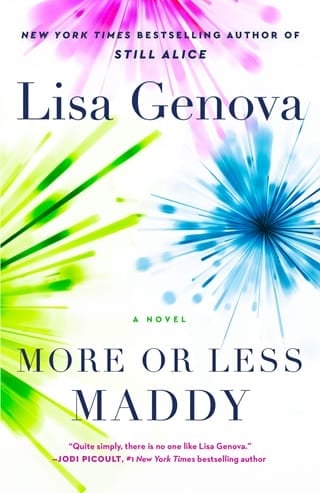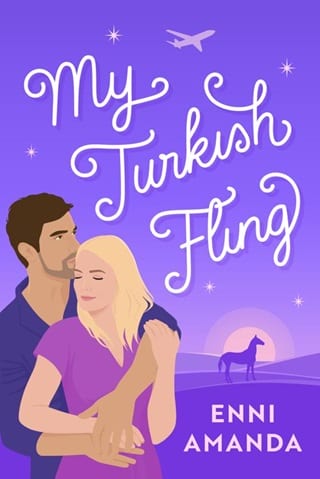Chapter 33
CHAPTER 33
Maddy remembers almost none of the three days she spent in the hospital. She remembers all of the three weeks she spent back at Garrison. She slept a lot, swallowed her morning and evening meds, went to group, had sessions with Dr. Weaver, and took some art therapy classes. Mostly collage. When asked if she enjoyed the classes, she said that she did but only because she knew that was the correct answer.
She was released on a Wednesday, the same day Emily landed at JFK, returning home from her honeymoon in Bali. Today is Saturday, and Emily is at the house, visiting for the weekend. She and Maddy are in the backyard, both in bathing suits and sunglasses, lounge chairs angled toward the late-morning sun, two glasses of iced cucumber water on the table between them. The magnolia tree that wows everyone with its ballet-slipper-pink blossoms in the spring is now just green-leaved and ordinary, nothing special, and no one comments on it. The landscapers mowed the lawn earlier this morning, and the air smells grassy.
Emily is still skinnier than she normally is, having lost weight she never needed to lose for the wedding. Her smooth skin is bronzed the color it would be after an entire summer spent lifeguarding at a beach, her blonde hair lightened by the Indonesian sun. She looks gorgeous, healthy.
Then there is Maddy. Her skin is pasty white, her belly puckered and flabby, her hair unwashed, a dull brown. She hasn’t shaved her legs or her pubes since God knows when.
“I’m sorry I ruined your bachelorette party,” says Maddy, summoning the courage to initiate this long-overdue conversation.
Emily says nothing at first. “Thank you.”
Maddy can’t see Emily’s eyes behind her polarized sunglasses. Her face remains impassive, her body unmoved. Maddy’s going to have to give more to get more.
“And I’m so sad I missed your wedding.”
She hates that she missed it. Emily in her gown, the vows, even if she personally thinks they add up to entrapment. Till death do us part was probably reasonable and even beneficial a hundred years ago, when women didn’t have educations, jobs, or, most important, birth control, and life expectancy was only forty-seven. Back then, women could expect to be popping out babies right up until death, so she can see how it was important to keep the breadwinner legally bound to that situation for the duration. But today, women have jobs and birth control, and life expectancy is close to eighty. Religion and romance aside, that’s a long-ass contract.
At least they got rid of obey .
She thinks about the wedding pictures she hasn’t seen yet, especially the family portraits absent Maddy in lavender silk chiffon. She imagines Emily’s grandchildren someday studying these photos in the wedding album, and one of them asks, Didn’t Grandma have a sister? Someone will answer, Yes. She was in the looney bin. Tried to kill herself. The children will go quiet and turn the page.
And that will be the sum total of how she is remembered by their family’s descendants. She shouldn’t care about, or be preoccupied with, even, what people think of her, but she does. Always has. And right now, she’s worried about what children who don’t even exist yet will think of her when she’s nothing but ashes. Her ashes will care.
“Don’t be sad,” Emily says, turning her head toward her sister, visibly triggered by Maddy’s use of the word that, in its darkest, most mutated extreme, caused this latest nightmare.
“Not I’m-going-to-kill-myself sad. Normal sad.”
Emily nods. “I’m sad, too.”
“I never meant to miss it.”
Emily shakes her head as she folds her arms. “How did you think you were going to kill yourself and then go to my wedding?”
“I know it doesn’t make any sense. It wasn’t logical. I just thought you’d all be better off if I was gone.”
Maddy wasn’t capable of considering dates on the calendar beyond the one she was living, her perspective narrowed to the cracker-thin hour of that day. And on that particular hour of that day in May, her existence felt too wretched and hopeless. Her death would be a relief and a big favor to everyone.
“That could never be true,” says Emily.
“It would definitely be easier.”
Emily sits up, cross-legged on the chair, and faces Maddy. She perches her sunglasses atop her head.
“No, this is hard some of the time. If we lose you to this, it will be hard all of the time, for the rest of our lives.”
“I don’t know.”
“I’d rather have a bipolar sister than no sister.”
“Is there an option C?”
“You have to promise to never do that again. Call me or 911 or a suicide hotline or freakin’ pizza delivery. I don’t care, anybody. Okay?” asks Emily, her voice high, loud, and shaking, her bright-blue eyes welling with tears.
“Okay,” Maddy says, knowing that the person who’s agreeing to this promise in good faith right now won’t be available to make a phone call if she’s swallowed by earth, suffocating at the bottom of that dark hole again.
Emily sighs, wipes her nose and eyes, and takes a sip of water. “It’s so weird. It’s like you’re three different people.”
“Manic Maddy, Middle Maddy, and Depressed Maddy.”
Emily smiles, amused. “Yeah, exactly.”
“Manic Maddy’s really fun,” says Maddy.
“Until she’s not.”
“True.”
“Where are you at right now?”
She feels tired but not sleepy, exhausted from the meds and from carrying the waterlogged, deadweight of shame. Her stomach is unsettled, her head wooly, and her hand tremors are back with a vengeance. But the warm sun feels good in her bones. She applied sunscreen without being told. And talking with her sister again feels easy, like all of her lost and wandering molecules have found their way home.
“Still depressed but moving toward Middle Maddy.”
“Good. Stay on your meds.”
“The side effects aren’t fun, Em.”
“Was losing your tooth in the Atlanta airport fun? Was missing my wedding fun?”
“Good point.”
“You’re going to get there. I’ve read a lot about this, and everyone says it takes time to adjust to the diagnosis and medications. Cycling high to low, going off your meds, all super common in the beginning. You’re going to land on a combination of meds that work and that you can stay committed to, and you’re going to do what you have to do to live as much of your life as possible in the middle. You’re on the right path.”
A page from Maddy’s philosophy class last fall opens in her consciousness. It was about Buddha. Having lived in both total self-denial and total self-indulgence, he ultimately came to realize that living in either extreme was a useless way to exist. Only the middle path could offer the possibility of true awakening.
“How’s married life?”
“Good, I guess. Kind of the same. I went off birth control.”
“Me, too.”
Maddy has an appointment with the gynecologist next week. Her mother’s insisting that she get an IUD over another arm bar, naively surmising that a device housed inside Maddy’s uterus would be safer than one beneath the skin of her upper arm. Her mother clearly doesn’t understand the unstoppable, limitless mind of mania. If she’s manic and decides that her IUD has to go, she’d have no problem going in up to her elbow to find the string and yank it out.
“How was Bali?”
“Glorious. Relaxing. How was Garrison?”
“Same. I can’t believe I’ve been there three times in eight months. I wonder if they have a rewards program.”
“That’s not funny,” says Emily.
“I’d have all the points. ‘For your next stay, we’ve upgraded you to a private room and all the Jell-O and coleslaw you can eat.’?”
“No next stay,” says Emily, pointing at her like a motivational speaker, voicing a reality she’s prepared to manifest, willing it to be so.
“No next stay,” says Maddy, mirroring her words but unable to match her sister’s conviction.
 Fullepub
Fullepub 



